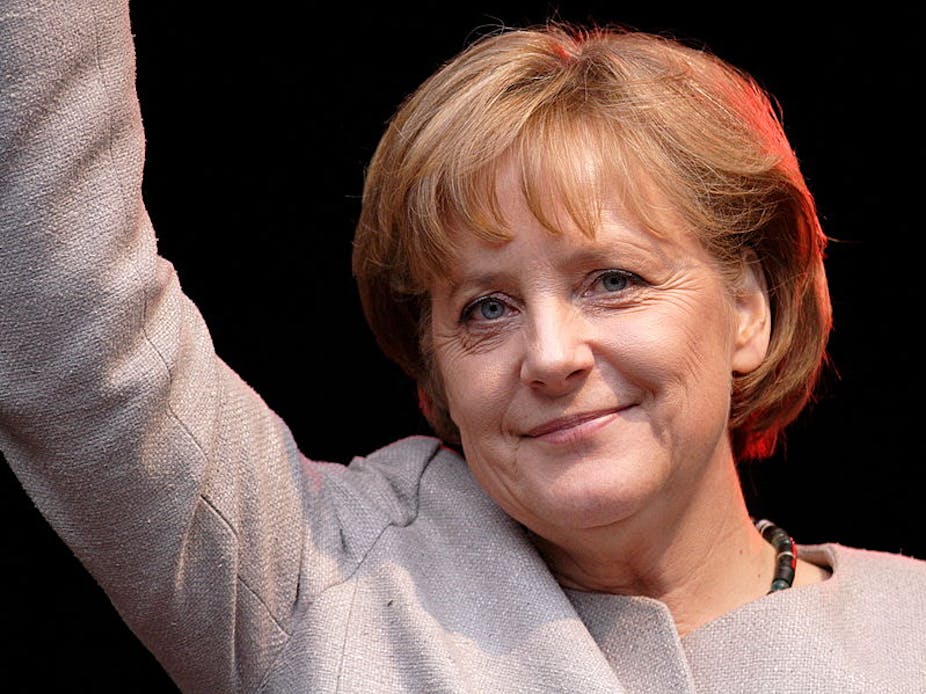When in 1987 Margaret Thatcher won the third of her three elections in the UK, she was at the height of her powers. She governed in almost monarchical style, her (internal and external) opponents either (metaphorically) dead or muted. Angela Merkel’s third election triumph should, at least in theory, leave her in a very similar position in Germany. She has skilfully manoeuvred her way up the greasy political pole and no one - as was amply evident last week - can touch her. For many, she is German politics.
Yet, the curiously complex election result of 22 September has undoubtedly made Merkel’s life more difficult than it was before. Her CDU/CSU missed out on an overall majority (something that has only been achieved once since the Federal Republic was founded in 1949) by just five seats, and she realistically knows that the only way she can square that particular circle is by governing with the major party of the centre-left, the SPD. They’ve worked together before (2005-09), and before the election this coalition option regularly came out on top as Germans’ most preferred post-election government. So, where’s the problem?
The problem is a simple one. Any party that works with Merkel comes off second best. Ask the Free Democratic Party (FDP). The FDP had been in every parliament since 1949, regularly acting as a liberal coalition kingmaker for the CDU/CSU, precisely as they did between 2009-2013. Despite a rocky first couple of years, the liberals expected to pick up and poll above the 5% threshold needed to gain entry in to the Bundestag. They failed, much of their top brass has resigned, and they now face an uncertain future.
The Social Democrats understand the FDP’s problems. They worked - frequently very well - with the Christian Democrats from 2005-09 and were rewarded with their worst election result in history (23.6%). They improved in 2013, but not by much. The message here is that Merkel is remarkably effective at epitomising all that is good in her government’s work, leaving the smaller coalition partner looking suspiciously like a makeweight. This has not been lost on the SPD, and they meet on Friday to discuss their strategy for dealing with Merkel’s CDU. Whatever the details end up being, the SPD will demand the coalition agreement pays much more than lip service to their key programmatic demands. Expect to see the issue of a national minimum wage (something Germany doesn’t currently have) play a prominent role as will a variety of domestic demands in the areas of social welfare.
One area where you will not see much change is that of European policy. Or, more specifically, policies dealing with the Eurocrisis. The SPD - despite much bluff and bluster - has supported Merkel in all of her most dramatic dealings with Europe. It may traditionally be seen as the job of an opposition to oppose, but the SPD has often opted to back Merkel in the name of the national interest. Understandable though that is, it has left the door open for an awkward squad from the left, centre and most interestingly the right, to gain in prominence.
The socialist Left Party predictably decried Merkel’s Euro policy as being a (Northern European) capitalist plot, while a number of recalcitrant members of the FDP bemoaned the lack of parliamentary control over the various bailout packages launched. The German constitutional court had sympathy, but not enough to uphold their attempts to block them. The really interesting opposition came from the right. And not the Christian Social Union (CSU) in Bavaria, a party that sits on the same benches as the CDU and periodically prides itself on its eurogrumpiness (“where are all these German taxes going?”), but rather the Alternative für Deutschland a new anti-Euro party that adopted an altogether more radical and ungermanic discourse.
The AfD may well have (just) failed to enter parliament (4.7%), but it added an uncomfortable Eurosceptic tone to the campaign. The AfD claimed that the Euro is now a failed currency and that in order to save the EU as a whole and indeed to carry on towards European unity - two things it expressly claims to support - then the Euro has to go. Euroscepticism á la UKIP has never worked in Germany, but the AfD represents a peculiarly German way of showing how the EU is not functioning as many would like.
If Eurozone economies pick up and if the party’s largely unknown leaders fail to make an impression, then the AfD may just drift away in to obscurity. But 2014 sees elections to the European Parliament and Germany’s federal system means there are nearly always regional elections around the corner. The AfD may not be causing Angela Merkel worries now, but if she - and the other mainstream parties - fail to play their cards right, then the AfD may yet come back to haunt them.

